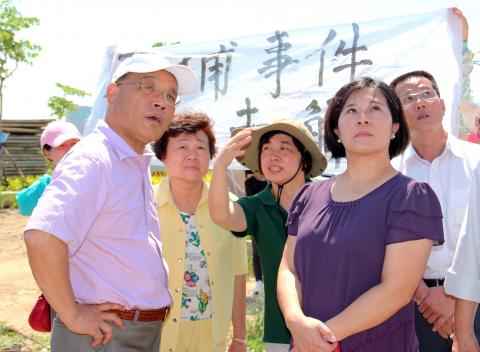Democratic Progressive Party (DPP) chairman Su Tseng-chang (蘇貞昌) yesterday visited the four families in Dapu Borough (大埔), Miaoli County, whose houses were demolished last month, condemning the county government and pledging his efforts to amend laws concerning land expropriation.
“There are times when the government has to expropriate private land for the benefit of the public, but this should happen only when it is absolutely necessary for the good of the public — not for the good of big corporations or political leaders,” Su said.
“When the government takes private land, it must make sure that the expropriation is carried out in an appropriate manner,” Su added.

Photo: CNA
“The government should not view those who oppose the expropriation as enemies. Government leaders should not tear down people’s houses whenever the ‘godgiven opportunity’ presents itself,” he said.
Su was referring to the Miaoli County Commissioner Liu Cheng-hung’s (劉政鴻) response to criticism over the demolition of the houses belonging to families of Chang (張), Chu (朱), Huang (黃) and Ko (柯) when the families and their supporters protested the forced demolition plan in Taipei last month.
After speaking with the four families and visiting their houses — as well as the site where the Changs’ house once stood — Su said he understood why the demolitions had caused upset, adding that the county government’s reasoning that traffic would be blocked if the houses were not demolished was “just an excuse.”
During the visit, Chang Sen-wen (張森文), one of the former occupants of the demolished houses, asked Su to help to find ways to rebuild their homes.
Chang’s wife, Peng Hsiu-chun (彭秀春), urged the DPP to work to amend laws concerning the expropriation of private lands and houses, “because this could affect everyone.”
DPP Legislator Wu Yi-chen (吳宜臻), who accompanied Su on the visit, said the DPP caucus would do its best to campaign for the revision of the Land Expropriation Act (土地徵收條例) and the Agricultural Development Act (農業發展條例).
“The Land Expropriation Act needs revision to guarantee a more just and transparent review process for land seizure,” Wu said.
“It is surprising that there currently is no mechanism to protect farmers from having their farmland taken by the government. Instead, there are clauses facilitating the expropriation of farmlands for development projects,” Wu said.
Wu added that besides amending the laws concerning land expropriation, she would try to make a law on farmlands.
“At this point in time, I think we need more comprehensive laws to protect our farmlands from being used for non-agricultural purposes,” Wu said. “This would be the next appropriate step after amending the Land Expropriation Act and the Agricultural Development Act.”

Several Chinese Nationalist Party (KMT) officials including Chairman Eric Chu (朱立倫) are to be summoned for questioning and then transferred to prosecutors for holding an illegal assembly in Taipei last night, the Taipei Police said today. Chu and two others hosted an illegal assembly and are to be requested to explain their actions, the Taipei City Police Department's Zhongzheng (中正) First Precinct said, referring to a protest held after Huang Lu Chin-ju (黃呂錦茹), KMT Taipei's chapter director, and several other KMT staffers were questioned for alleged signature forgery in recall petitions against Democratic Progressive Party (DPP) legislators. Taipei prosecutors had filed

Taiwan would welcome the return of Honduras as a diplomatic ally if its next president decides to make such a move, Minister of Foreign Affairs Lin Chia-lung (林佳龍) said yesterday. “Of course, we would welcome Honduras if they want to restore diplomatic ties with Taiwan after their elections,” Lin said at a meeting of the legislature’s Foreign Affairs and National Defense Committee, when asked to comment on statements made by two of the three Honduran presidential candidates during the presidential campaign in the Central American country. Taiwan is paying close attention to the region as a whole in the wake of a

President William Lai (賴清德) has appointed former vice president Chen Chien-jen (陳建仁) to attend the late Pope Francis’ funeral at the Vatican City on Saturday on his behalf, the Ministry of Foreign Affairs said today. The Holy See announced Francis’ funeral would take place on Saturday at 10am in St Peter’s Square. The ministry expressed condolences over Francis’ passing and said that Chen would represent Taiwan at the funeral and offer condolences in person. Taiwan and the Vatican have a long-standing and close diplomatic relationship, the ministry said. Both sides agreed to have Chen represent Taiwan at the funeral, given his Catholic identity and

NEW WORLD: Taiwan is pursuing innovative approaches to international relations through economics, trade and values-based diplomacy, the foreign minister said Taiwan would implement a “three-chain strategy” that promotes democratic values in response to US tariffs, Minister of Foreign Affairs Lin Chia-lung (林佳龍) said. Taiwan would aim to create a “global democratic value chain,” seek to capitalize on its position within the first island chain and promote a “non-red supply chain,” Lin was quoted as saying in the ministry’s written report to the Legislative Yuan submitted ahead of the legislature’s Foreign Affairs and National Defense Committee meeting slated for today. The Ministry would also uphold a spirit of mutual beneficial collaboration, maintaining close communication and consultations with Washington to show that Taiwan-US cooperation